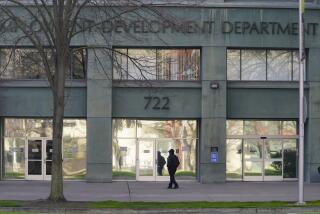Lendco Shifts as Car Market Loses Speed : Auto leases: The Calabasas concern once had more business than it could deal with. But the current slump has forced the company to work harder at getting dealers’ business.
- Share via
Richard Hillery remembers when his company, Lendco Acceptance Corp., had as much business as it could handle. That was two years ago, when Lendco, a Calabasas concern founded in 1986, teamed up with Imperial Savings of San Diego to provide car loans and leases.
“We had people working in the hallways,” said Hillery, Lendco’s executive vice president and chief operating officer, who with chairman Richard L. Watt, got the company started with $500,000. “We were bulging at the seams.”
Lendco, which arranged the deals between car dealers and consumers, was raking in up to $1 million a month in fees, and its employment swelled to 220. (Imperial simply provided the cash.) Lendco announced plans to move into a new headquarters in Westlake Village and predicted a nationwide expansion.
Not any more. Because Imperial became insolvent in 1989, privately held Lendco today has pared its business just to leasing. It has only 48 employees and no longer needs new headquarters. Lendco’s 1990 revenue will total about $4.6 million, down 15% from the previous year, in large part because the overall car industry is now slumping, Hillery said.
And with the car market slowing, Lendco--which now gets its money from a Xerox Corp. finance unit instead of Imperial--must grab market share from rivals if it hopes to grow again. “Even though the pie has gotten smaller, we want to make sure we maintain our part of it,” Hillery said.
But that’s a daunting task for modest Lendco because it competes with such car leasing giants as Security Pacific, Wells Fargo and other major California banks, along with the finance arms of General Electric Co. and the car makers themselves, such as General Motors Corp., Ford Motor Co. and Toyota Motor Co. Because of their size, they can offer attractive leasing rates on some cars that Lendco can’t match.
When a driver leases a car, Lendco effectively buys the car from the dealer with Xerox’s cash and leases it to the driver. Lendco earns a fee for arranging the deal, typically about $650 on a $20,000 car. Auto leases tend to last from two to five years.
On a national basis, Lendco is a small fry in leasing. The company operates in eight other states, and this year will arrange leases for about 7,000 cars with a total value of $145 million, Hillery said. By comparison, GE last year did $4.6 billion worth of vehicle leases; Ford’s leases totaled more than $2 billion.
Still, Lendco has managed to become one of California’s major auto-leasing companies. “We use them to a large extent,” said Frank Regalado, executive manager of Kramer Motors in Santa Monica, which sells Hondas, Volvos, Acuras and Nissans. He particularly commends parts of Lendco’s service, such as quickly sending payment checks to the dealership. “Their turnaround time is good,” he said.
But Lendco’s rivals aren’t impressed. “We’re all very quick and very expedient,” said Kenneth Clark, consumer leasing manager for Ford Motor Credit Co., which leased more than 100,000 vehicles last year. “We’re also very quick in making credit decisions.”
Indeed, one of Lendco’s biggest challenges is persuading more dealers to use Lendco. When a consumer agrees to lease a car, the dealer usually can turn to several leasing companies to find the most attractive deal. The monthly lease payments a consumer pays depend mostly on the car’s residual value--what the leasing companies believe the car will be worth when the lease expires. Those estimates can vary widely from one leasing company to the next, and dealers like to shop around.
The result: Lendco has agreements to provide leases to about 2,000 car dealers, but 10% of them generate 80% of the company’s business, Hillery said.
Lendco’s salad days came to an end in 1989 when Imperial Savings, then a unit of Imperial Corp. of America, quickly deteriorated into one of the nation’s S&L; casualties. (It eventually was seized by federal regulators and is now called Imperial Federal Savings & Loan.) Imperial cut Lendco loose, forcing Lendco to find a new source of funds.
Lendco briefly hooked up with Financial Federal Savings, a Miami thrift. But in April, it turned to LMV Leasing, a finance unit of Xerox, to provide its cash. “Right now, Xerox would like more volume than we can give them,” Hillery conceded.
How can Lendco get more dealers to send it business? Lendco thinks its “tiered,” or “ABC” credit system will appeal to more of them. Under the system, Lendco will take customers with varying credit-worthiness--charging a lower monthly payment for A, or excellent, credit and a higher one for Bs and Cs, or those with some credit problems.
Most of Lendco’s rivals have one set of lease requirements. At Ford, for instance, “you either qualify or you don’t,” Clark said.
Lendco said its system does not mean it’s taking on inordinate risk that could later backfire. It still turns down more than half of the lease applications it receives. But the tiered system allows more people to qualify, enabling dealers to lease cars immediately. Dealers like that, because once customers are interested in a car, they don’t want them to walk out the door until the leasing papers are signed.
“The ABC rate is attractive,” said Lou Ozonko, finance manager for Woodland Hills Honda.
Watt borrowed the idea in early 1987 from Countrywide Credit Industries, a Pasadena-based financial services concern. Watt and Hillery, both 52, who had previously worked at Southwest Leasing in Los Angeles, were at the time running Auto Leasing Connection, a company that was managing Countrywide’s leased fleet of cars.
It was then that they were asked by Imperial to work with car dealers in arranging consumer leases. In view of Countrywide’s tiered system, Hillery said the pair decided, “Why don’t we do the same thing with cars? The dealers loved it, and our business started skyrocketing.”
Now, however, Lendco is battling its many rivals in a sluggish car market. The downturn already has prompted banks to tighten their credit requirements on car loans, upsetting dealers who find that their customers are being turned down for financing.
Consumers who lease often need a better credit history than those who buy, mainly because a lessee puts down little or none of his own money before driving away. But with banks making car loans less available to the public, Lendco and other leasing companies might get a boost.
“It should be a marketing opportunity for us because our credit criteria has not changed,” said Martin S. Phillips, Lendco’s senior vice president.
David Clark, a leasing consultant in Pasadena, agreed that “if the banks are tightening, then leasing may rise. People still will need cars. That could be a plus for Lendco.”
There’s just one problem, Clark added: The car manufacturers, armed with huge resources and marketing budgets, “have become far more aware” of the leasing market in the past two years. “And the factories are becoming more aggressive” in providing financing to customers, he said.
More to Read
Inside the business of entertainment
The Wide Shot brings you news, analysis and insights on everything from streaming wars to production — and what it all means for the future.
You may occasionally receive promotional content from the Los Angeles Times.











